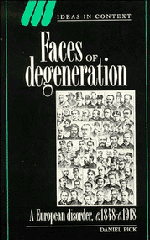6 - Fictions of degeneration
Published online by Cambridge University Press: 03 May 2011
Summary
‘Suddenly it rained apes.’
Much of the argument so far has depended upon little-known nineteenth-century material. But if we re-read some of the most familiar of all English-language fictions from the period we find degeneration a recurrent concern. What follows in this chapter is in part simply a demonstration of the existence of that preoccupation in literary texts; but the aim is also to take various examples where a certain interrogation of, or even resistance towards, degeneration is manifest.
‘There are some trees, Watson’, declared Sherlock Holmes,
‘which grow to a certain height, and then suddenly develop some unsightly eccentricity. You will see it often in humans. I have a theory that the individual represents in his development the whole procession of his ancestors, and that such a sudden turn to good or evil stands for some strong influence which came into the line of his pedigree. The person becomes, as it were, the epitome of the history of his own family.’
‘It is surely rather fanciful’ replied Watson (p. 494). Here was the voice of what is often taken to be the dominant English response to such ‘theory’, a pervasive ‘Anglo-Saxon’ scepticism towards the fanciful excesses of ‘foreign’ proposals.
- Type
- Chapter
- Information
- Faces of DegenerationA European Disorder, c.1848–1918, pp. 155 - 175Publisher: Cambridge University PressPrint publication year: 1989



